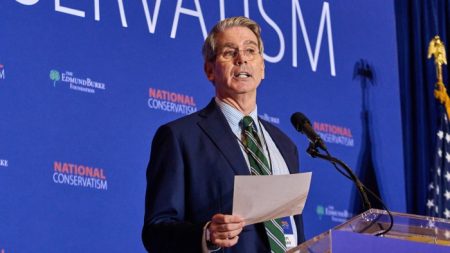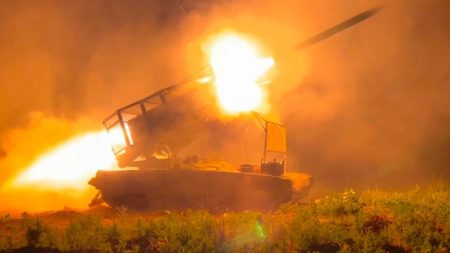At the last bus stop before Pakistan’s mountainous border with Afghanistan, Gul Khan, 35, is heaving a small refrigerator on to a truck, en route to his ancestral land.
Khan, who is leaving with his wife and eight children, has never set foot in Afghanistan, which has been under the rule of the Islamist Taliban for more than two years. He was born in Pakistan to parents who fled their homeland after the Soviets invaded in 1979.
He is complying with a Pakistani government order for undocumented migrants to leave and will go to a country in the grip of one of the world’s worst humanitarian crises.
“One day the Pakistani government announced that all Afghans without valid papers must leave,” Khan said. “My parents never made their papers to stay in Pakistan, and I had no papers too.”
The refrigerator, he said, might end up being superfluous. The camps for returning refugees just across the border are rumoured to be poorly equipped. They have heard they lack electricity.
Khan has repeatedly tried, without success, to contact his wife’s brother, their only known relative in the country. “The number we have is always switched off,” he said. “We can’t reach him for help.”
The UN estimates that more than 200,000 Afghans without papers have left Pakistan for Afghanistan since Islamabad announced its “Illegal Foreigners Repatriation Plan” just over a month ago.

“The order has sent a clear shockwave of fear and panic among Afghans in Pakistan,” said Babar Baloch, regional spokesperson for the UNHCR, the UN’s refugee agency, in Bangkok. “Since it was announced, we have seen undocumented Afghans leaving Pakistan in droves.”
Pakistan said its decision was in response to a surge in the number of terrorist attacks this year, in which hundreds of people have died and which officials say were largely carried out by Afghanistan-based groups.
“We are attacked from within Afghanistan and Afghan nationals are involved in attacks on us,” Pakistan’s interior minister said when announcing the expulsion order in early October. “We have evidence.”
However, aid groups have raised alarm over the implications of the expulsion of undocumented Afghans. They say that many were born in Pakistan, many are vulnerable and they are going to a country in crisis.
The order by Pakistan’s caretaker government was followed by house-to-house searches. Undocumented Afghans were given a deadline to leave of November 1, leading to crowds building up at the border in recent days.
Zaffar Samad Khan, 25, recalls being told that “you must now return to Afghanistan” by policemen who came to his home in Faisalabad, Punjab, where he earned a living making Islamic prayer beads. “That is your only choice.”
Khan, no relation to Gul Khan, said he did not resist because he wanted to “avoid the humiliation” of arrest. With his wife and two children he is heading for a country in which he has never been.
Pakistan has a long record of hosting refugees, and alongside Iran accepted most of the people who fled Afghanistan after the Taliban’s takeover in August 2021.
Aid agencies have said that up to 1.7mn Afghans live in Pakistan without visas or registrations, including many of the roughly 600,00 who fled after 2021.

“The worry we have is that, among undocumented Afghans, are people who have valid fears for their safety once they are sent back,” said Baloch. “Many have returned, but there was a clear indication that they left [Afghanistan] in fear of being detained or arrested.”
The expulsion is happening as the region’s cold weather sets in. Nearly 30mn people — almost three-quarters of Afghanistan’s population — depend on aid handouts, and 3.3mn are internally displaced, including thousands who lost their homes after earthquakes, according to the UN.
Humanitarian groups have urged Pakistan to halt involuntary returns. In a statement last week, the UNHCR, the IOM — the UN’s migration agency — and Unicef, the UN children’s fund, said that, while Pakistan’s plan was aimed at repatriating undocumented foreigners, registered refugees and others with legal documents were reportedly being “being pressurised” to leave, including children and women.

“Quite a lot of this population that is going back are children. We worry about their access to such services as education, healthcare and basic necessities such as food and shelter,” said Itayi Viriri, an IOM spokesperson.
The Taliban says the expulsion is a “tactic aimed at putting pressure on the new Afghan government”, adding that it has set up 12 committees tasked with catering to the refugees, including arranging their resettlement. “The Afghan government has constituted a committee of lawyers to defend the rights of those refugees whose properties and money have been taken,” Mohammed Suhail Shaheen, head of the Taliban’s political office, said. “The intentional mistreatment by police of the Afghan refugees is against all laws and norms of good neighbourliness.”
Pakistan’s government did not respond to a request for comment.
The expulsions are happening when Pakistan’s economy is in a slump and its politics are in turmoil following the imprisonment of opposition leader Imran Khan in August. Pakistan’s election commission said last week that a much-delayed general election would be held on February 8.
Opinions in Pakistan on the expulsions are divided. “For a while, the returning refugees will feel the pain, but ultimately their return will build up confidence among Afghans over the future of their own country,” said Sameer Gul, a fruit seller in Peshawar, long a haven for refugees.
However, Tehmina Gul, not related to Sameer Gul, said the expulsion would feed resentment. “When we push them back to a country where the Taliban don’t allow girls to even go to school, how do you think the Afghans will feel about Pakistan?” she said. “I will certainly never want to raise my daughters in such a difficult country.”
Read the full article here















